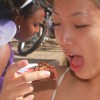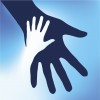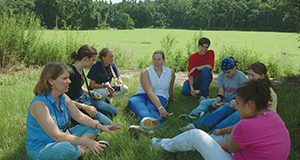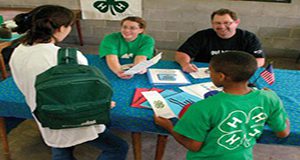This 3-page publication is one in the series Risk Management for 4-H Youth Development Work. It focuses on the basic overall precautions that need to be taken by everyone involved with 4-H. Written by Paula Davis, Dale Pracht, Stefanie Prevatt, Janet Psikogios, Kate Fogarty, Jean Hink, and Marilyn Norman and published by the UF/IFAS 4-H Youth Development Department, September 2018.
http://edis.ifas.ufl.edu/4h393
Tag: Kate Fogarty
Risk Management for 4-H Youth Development Work: Pre-Event Planning Guide and Matrix
This is the first publication in the Risk Management for 4-H Youth Development Work series. This series is intended to prepare UF/IFAS Extension county faculty, staff, volunteers, and youth for the important task of providing best practices in risk management strategies. This 5-page fact sheet discusses the matrix, levels of risk, probability that something will go wrong, modifications to the event or activity, and post-event assessment. Written by Dale Pracht, Paula Davis, Stefanie Prevatt, Janet Psikogios, Marilyn Norman, Kate Fogarty, and Jean Hink, and published by the UF/IFAS 4-H Youth Development Department, revised March 2018.
http://edis.ifas.ufl.edu/4h299
Risk Management for 4-H Youth Development Work: Records
This 2-page publication is one in the series Risk Management for 4-H Youth Development Work. It discusses the use of records among 4-H participants. Written by Paula Davis, Dale Pracht, Stefanie Prevatt, Janet Psikogios, Marilyn Norman, Kate Fogarty, and Jean Hink and published by the UF/IFAS 4-H Youth Development Department, February 2018.
http://edis.ifas.ufl.edu/4h387
Risk Management for 4-H Youth Development Work: Records and Contracts
This 2-page publication is one in the series Risk Management for 4-H Youth Development. This document will clarify the expectations and procedures for signature authority regarding contracts within UF/IFAS Extension. Written by Stefanie Prevatt, Dale Pracht, Paula Davis, Janet Psikogios, Marilyn Norman, Kate Fogarty, and Jean Hink and published by the UF/IFAS 4-H Youth Development Department, January 2018.
http://edis.ifas.ufl.edu/4h295
Risk Management for 4-H Youth Development Work: Transportation
This 3-page document is one in the series Risk Management for 4-H Youth Development Work. It describes the best practices and procedures for transportation to and from Florida 4-H activities. Written by Stefanie Prevatt, Dale Pracht, Paula Davis, Janet Psikogios, Marilyn Norman, Kate Fogarty, and Jean Hink and published by the UF/IFAS 4-H Youth Development Department, February 2018.
http://edis.ifas.ufl.edu/4h298
Risk Management for 4-H Youth Development Work: Insurance
This 4-page publication is one in the series Risk Management for 4-H Youth Development Work. It reviews policies and best practices for understanding insurance when working with UF/IFAS Extension programs. Written by Stefanie Prevatt, Dale Pracht, Paula Davis, Janet Psikogios, Marilyn Norman, Kate Fogarty, and Jean Hink and published by the UF/IFAS 4-H Youth Development Department, February 2018.
http://edis.ifas.ufl.edu/4h296
The Risks of Obesity, Weight Control Behaviors, and Disordered Eating on (to) Adolescents
 Over the past 15 years, unhealthy weight-loss behaviors among U.S. adolescents are becoming more widespread. This 5-page fact sheet addresses the consequences and risks associated with risky weight-control practices and discusses the prevalence of eating disorders and the role of body image in weight practices. The publication also provides references that can be used to help practitioners educate youth on the importance of setting realistic goals and enhancing body satisfaction. Written by Emily Johnson and Kate Fogarty, and published by the UF Department of Family Youth and Community Sciences, September 2014. (AP Photo/University of Florida/IFAS/Josh Wickham)
Over the past 15 years, unhealthy weight-loss behaviors among U.S. adolescents are becoming more widespread. This 5-page fact sheet addresses the consequences and risks associated with risky weight-control practices and discusses the prevalence of eating disorders and the role of body image in weight practices. The publication also provides references that can be used to help practitioners educate youth on the importance of setting realistic goals and enhancing body satisfaction. Written by Emily Johnson and Kate Fogarty, and published by the UF Department of Family Youth and Community Sciences, September 2014. (AP Photo/University of Florida/IFAS/Josh Wickham)
http://edis.ifas.ufl.edu/fy1452
Save a Child: How to Identify and Report Child Abuse (FCS2119/HE855)
 People who work with children, parents, and the general public may at some point in their lives and careers have to report child abuse. It is important that you be able to recognize the symptoms of abuse and be able to contact the appropriate authorities. By reporting abuse, you may save a child’s life or prevent serious injury. This 4-page fact sheet discusses child abuse laws and procedures for reporting abuse. It also contains information about different types of abuse and how to identify abused or neglected children. Characteristics listed here are general and intended as guidelines. A child or family may exhibit many warning signs of abuse, though no abuse has occurred or ever will occur. Written by Andrew E. Toelle and Kate Fogarty, and published by the UF Department of Family Youth and Community Sciences, January 2013.
People who work with children, parents, and the general public may at some point in their lives and careers have to report child abuse. It is important that you be able to recognize the symptoms of abuse and be able to contact the appropriate authorities. By reporting abuse, you may save a child’s life or prevent serious injury. This 4-page fact sheet discusses child abuse laws and procedures for reporting abuse. It also contains information about different types of abuse and how to identify abused or neglected children. Characteristics listed here are general and intended as guidelines. A child or family may exhibit many warning signs of abuse, though no abuse has occurred or ever will occur. Written by Andrew E. Toelle and Kate Fogarty, and published by the UF Department of Family Youth and Community Sciences, January 2013.
http://edis.ifas.ufl.edu/he855
Adolescent Bullying and Family Therapy (FAR1204/FM399)
 “As much as parents like to think that bullying is something that’s outgrown in childhood, unfortunately it’s actually on the increase in adolescence. There are various individual and school-based approaches to dealing with bullying, but a new intervention that you might find surprising is none other than family therapy. ” This 2-page Family Album Radio transcript was written by Kate Fogarty, and published by the UF Department of Family Youth and Community Sciences, August 2012.
“As much as parents like to think that bullying is something that’s outgrown in childhood, unfortunately it’s actually on the increase in adolescence. There are various individual and school-based approaches to dealing with bullying, but a new intervention that you might find surprising is none other than family therapy. ” This 2-page Family Album Radio transcript was written by Kate Fogarty, and published by the UF Department of Family Youth and Community Sciences, August 2012.
http://edis.ifas.ufl.edu/fm399
Cyberbullying (FAR1713/FM398)
 “Bullying, or aggression on a continual basis between peers where one has a power advantage over another—is common among children and adolescents. Using intimidation and physical force or spreading rumors is often what comes to mind when we think of bullying. However, a form that parents and teachers may be less aware of is called “cyberbullying.” This involves put-downs, publicly sharing personal information, stalking, and other overt attacks upon a person, all using electronic communication.” This 2-page Family Album Radio transcript was written by Kate Fogarty and published by the UF Department of Family Youth and Community Sciences, August 2012.
“Bullying, or aggression on a continual basis between peers where one has a power advantage over another—is common among children and adolescents. Using intimidation and physical force or spreading rumors is often what comes to mind when we think of bullying. However, a form that parents and teachers may be less aware of is called “cyberbullying.” This involves put-downs, publicly sharing personal information, stalking, and other overt attacks upon a person, all using electronic communication.” This 2-page Family Album Radio transcript was written by Kate Fogarty and published by the UF Department of Family Youth and Community Sciences, August 2012.
http://edis.ifas.ufl.edu/fm398
Online Sexual Solicitation (FAR1210/FM431)
 “Internet connectivity in the form of blogs, chat rooms, and forums can be hazardous to our teens today. These online communication aids are not themselves the problem; rather, teens face an ever-present threat of being sexually solicited online.” This 2-page Family Album Radio transcript was written by Kate Fogarty, and published by the UF Department of Family Youth and Community Sciences, July 2012.
“Internet connectivity in the form of blogs, chat rooms, and forums can be hazardous to our teens today. These online communication aids are not themselves the problem; rather, teens face an ever-present threat of being sexually solicited online.” This 2-page Family Album Radio transcript was written by Kate Fogarty, and published by the UF Department of Family Youth and Community Sciences, July 2012.
http://edis.ifas.ufl.edu/fm431
Teens and Dating: Tips for Parents (FAR1211/FM438)
 “I’ll never forget the initial shock I felt when my second grader came home from school one day to tell me that one of her friends was “going out” with one of the little boys in her class. “Going out?!” I asked. “What does that mean?” She couldn’t really answer, much to my relief. Many parents might likewise find themselves unprepared when they first learn their elementary and middle schoolers have developed perfectly normal crushes on their classmates.” This 2-page Family Album Radio transcript was written by Kate Fogarty and Donna Davis, and published by the UF Department of Family Youth and Community Sciences, July 2012.
“I’ll never forget the initial shock I felt when my second grader came home from school one day to tell me that one of her friends was “going out” with one of the little boys in her class. “Going out?!” I asked. “What does that mean?” She couldn’t really answer, much to my relief. Many parents might likewise find themselves unprepared when they first learn their elementary and middle schoolers have developed perfectly normal crushes on their classmates.” This 2-page Family Album Radio transcript was written by Kate Fogarty and Donna Davis, and published by the UF Department of Family Youth and Community Sciences, July 2012.
http://edis.ifas.ufl.edu/fm438
Talking to Your Teens about Dating (FAR1212/FM443)
 “Talking to teenagers about dating may seem like a daunting task to some parents who are thinking their teen will assume the “Oh no, not another parent talk again” posture. You know the one—head cocked, eyes rolled, and arms crossed. However, talking about it can be very important in determining how your teen approaches dating and his or her future relationships.” This 2-page Family Album Radio transcript was written by Kate Fogarty and Donna Davis, and published by the UF Department of Family Youth and Community Sciences, July 2012.
“Talking to teenagers about dating may seem like a daunting task to some parents who are thinking their teen will assume the “Oh no, not another parent talk again” posture. You know the one—head cocked, eyes rolled, and arms crossed. However, talking about it can be very important in determining how your teen approaches dating and his or her future relationships.” This 2-page Family Album Radio transcript was written by Kate Fogarty and Donna Davis, and published by the UF Department of Family Youth and Community Sciences, July 2012.
http://edis.ifas.ufl.edu/fm443
Los roles comunes de los papás: Las tres P y las dos C (FCS2140Span/FY1249)
 Los papás juegan muchos roles en la crianza de sus hijos. Algunos están involucrados en cada etapa de sus vidas, mientras que otros se concentran en uno o dos aspectos. Hoy, en los Estados Unidos los papás toman más responsabilidad en la crianza de sus hijos, comparado con las generaciones anteriores. Estudios de los comportamientos de la crianza sugieren que los papás tienden a concentrar sus esfuerzos en varias responsabilidades básicas. El rol de ellos tiende a ser definido por “las tres P y las dos C”
Los papás juegan muchos roles en la crianza de sus hijos. Algunos están involucrados en cada etapa de sus vidas, mientras que otros se concentran en uno o dos aspectos. Hoy, en los Estados Unidos los papás toman más responsabilidad en la crianza de sus hijos, comparado con las generaciones anteriores. Estudios de los comportamientos de la crianza sugieren que los papás tienden a concentrar sus esfuerzos en varias responsabilidades básicas. El rol de ellos tiende a ser definido por “las tres P y las dos C”
This 4-page fact sheet is the Spanish language version of The Common Roles of Fathers: The Five Ps. It was written by Kate Fogarty y Garret D. Evans, and published by the UF Department of Family Youth and Community Sciences, December 2011.
http://edis.ifas.ufl.edu/fy1249
Hablando con su hijo (FCS2006Span/FY1250)
 Hay muchas formas de ayudar a su niño a hablar. En este documento son unas sugerencias para el desarrollo de las habilidades del lenguaje.
Hay muchas formas de ayudar a su niño a hablar. En este documento son unas sugerencias para el desarrollo de las habilidades del lenguaje.
This 3-page fact sheet is the spanish language version of “Talking with Your Child.” It was written by Kate Fogarty y Millie Ferrer-Chancy, and published by the UF Department of Family Youth and Community Sciences, November 2011.
http://edis.ifas.ufl.edu/fy1250
Coordinating a Collegiate Service-Learning Mentoring Program (FCS9269/FY1242)
 Building a program like C.A.M.P. Gator for an institute of higher learning takes a great deal of planning, communication, and leadership. This 3-page fact sheet discusses the steps required to coordinate such a program. Written by Emily Rickerson, Matthew Ohlson, Kate Fogarty, Muthusami Kumaran, and Dale Pracht , and published by the UF Department of Family Youth and Community Sciences, August 2011. (Photo © C.A.M.P. Gator)
Building a program like C.A.M.P. Gator for an institute of higher learning takes a great deal of planning, communication, and leadership. This 3-page fact sheet discusses the steps required to coordinate such a program. Written by Emily Rickerson, Matthew Ohlson, Kate Fogarty, Muthusami Kumaran, and Dale Pracht , and published by the UF Department of Family Youth and Community Sciences, August 2011. (Photo © C.A.M.P. Gator)
http://edis.ifas.ufl.edu/fy1242
Challenges and Opportunities in Establishing a Collegiate Mentoring Program (FCS9268/FY1241)
 Developing a new program can present many challenges at any level. This 2-page fact sheet describes a number of challenges that arise at various stages of developing a mentoring program. Written by Emily Rickerson, Matthew Ohlson, Kate Fogarty, and Muthusami Kumaran, and published by the UF Department of Family Youth and Community Sciences, August 2011. (Photo © C.A.M.P. Gator)
Developing a new program can present many challenges at any level. This 2-page fact sheet describes a number of challenges that arise at various stages of developing a mentoring program. Written by Emily Rickerson, Matthew Ohlson, Kate Fogarty, and Muthusami Kumaran, and published by the UF Department of Family Youth and Community Sciences, August 2011. (Photo © C.A.M.P. Gator)
http://edis.ifas.ufl.edu/fy1241
Youth Mentoring: Involving College Students (FCS9267/FY1240)
 Today’s youth are facing a number of troubling issues including substance abuse, family disturbances, bullying, low morale resulting in low academic achievement, dropping out of school, and more. Having someone who cares about youth, to talk to them about the issues they face and mentoring them, can be a positive factor for all involved. This 3-page fact sheet was written by Emily Rickerson, Muthusami Kumaran, and Kate Fogarty about a collegiate mentor service learning program at the University of Florida., and published by the UF Department of Family Youth and Community Sciences, August 2011. (Photo © C.A.M.P. Gator)
Today’s youth are facing a number of troubling issues including substance abuse, family disturbances, bullying, low morale resulting in low academic achievement, dropping out of school, and more. Having someone who cares about youth, to talk to them about the issues they face and mentoring them, can be a positive factor for all involved. This 3-page fact sheet was written by Emily Rickerson, Muthusami Kumaran, and Kate Fogarty about a collegiate mentor service learning program at the University of Florida., and published by the UF Department of Family Youth and Community Sciences, August 2011. (Photo © C.A.M.P. Gator)
http://edis.ifas.ufl.edu/fy1240
Conducting a Community Forum to Address Youth Substance Abuse (FCS9266/FY1235)
 Community forums are about participatory democracy at a local level. They involve gathering citizens of a community together to discuss issues, make choices on how to deal with them, and develop common ground to resolve those issues. This 4-page fact sheet provides suggestions for leading and conducting a forum on youth substance abuse, based on the National Issues Forums (NIF) model. Written by Emily Rickerson, Muthusami Kumaran, and Kate Fogarty, and published by the UF Department of Family Youth and Community Sciences, August 2011. (Photo ©Grand Rapids, MI)
Community forums are about participatory democracy at a local level. They involve gathering citizens of a community together to discuss issues, make choices on how to deal with them, and develop common ground to resolve those issues. This 4-page fact sheet provides suggestions for leading and conducting a forum on youth substance abuse, based on the National Issues Forums (NIF) model. Written by Emily Rickerson, Muthusami Kumaran, and Kate Fogarty, and published by the UF Department of Family Youth and Community Sciences, August 2011. (Photo ©Grand Rapids, MI)
http://edis.ifas.ufl.edu/fy1235
Ser un papá comprometido: ¿Qué significa esto? (FCS2141Span /FY1231)
What exactly does it mean to be an involved father, and how does one go about having a healthy and involved relationship with one’s child? Find out in this 5-page Spanish-language fact sheet written by Kate Fogarty and Garret D. Evans, and published by the UF Department of Family Youth and Community Sciences, May 2011.
http://edis.ifas.ufl.edu/fy1231





